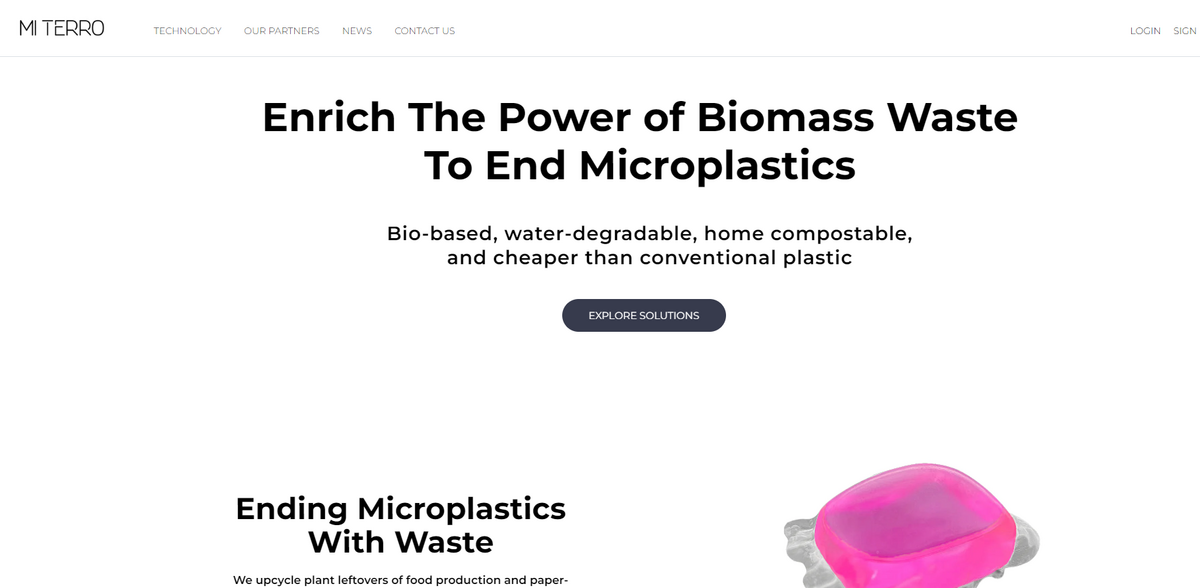What the Project Is
ENRICH THE POWER OF BIOMASS WASTE TO END MICROPLASTICS – a revolutionary approach that upcycles plant leftovers from food production and the paper-making process. This innovation transforms second-generation biomass wastes into a bio-based, water-degradable, home compostable solution – a first scalable replacement for polyvinyl alcohol (PVA). The patented material is engineered to replace microplastics in a variety of applications such as detergent and dishwasher pods, paper takeaway boxes, food packaging, textile processes, and even paper coating barriers. Crafted from natural sources that would otherwise be sent to landfill, the project harnesses nature’s resourcefulness, offering a cleaner alternative that leaves no trace of microplastics in the environment.
Main Benefit and Key Facts
The project provides a dual benefit: It reduces reliance on fossil fuel–derived materials while valorizing agricultural leftovers and paper-making residues. The following key figures highlight its transformative potential:
- 1.3 BILLION TONS of food in the world goes to waste every year.
- 46 MILLION TONS of plastic waste generated in the US every year.
- ONLY 5-6% of plastic is recycled in the US.
With a value proposition of being 10-40% cheaper than other bio-based materials, the project not only addresses critical environmental issues but also delivers substantial economic benefits to industries that adopt its materials.
Innovative Material Solutions
The project introduces an unprecedented innovation by replacing fossil fuel–derived polyvinyl alcohol with a bio-based alternative. This material is USDA Bio-based Certified and engineered to be both durable and sustainable. A closer look reveals that the approach does more than merely mimic conventional plastics – it redefines them. The bio-based polymers are compatible with existing plastic processing equipment, facilitating smoother transitions for manufacturing sectors looking to pivot to greener alternatives. Thanks to this agile and innovative spirit, traditional industries now have the opportunity to change course without compromising functionality or cost efficacy…
Diverse Applications
A variety of applications ensure that this bio-based material touches multiple market sectors. Its uses extend to detergent and dishwasher pods, food packaging, paper coating barriers, and even the textile industry. These applications underscore the versatility of the biomaterial, which adapts effortlessly from hydrophilic to hydrophobic requirements as needed. Notably, the material is designed to perform in settings that demand home compostability while also offering marine degradability – a clear nod to environmental sustainability. Everyday products such as detergent and laundry pods, paper takeaway boxes, and food packaging are being reimagined using nature-inspired innovations that prevent the environmental burden of microplastics.
Sustainability and Nature-Inspired Design
At its core, the project embraces sustainability. Bio-based polymers are created from biomass wastes that typically wind up in landfills, and this eco-friendly approach is both intentional and effective. With a clear commitment to reducing microplastics, the patented biomaterial ensures that, after use, it returns safely back to nature without leaving harmful residues. The material is designed to be not only durable but also benign in terms of environmental impact – a contrast to the prevailing fossil fuel–dependent plastics. In a casual yet determined manner, the approach celebrates nature’s inherent capabilities, reinforcing the hint that sometimes, the best solutions are the ones that come naturally.
Applications in Daily Life
The project’s impact resonates through daily life in numerous unexpected ways. Whether it is by coating paper packaging for improved barrier properties or by formulating detergent pods that perform under rigorous washing conditions, each product benefits from groundbreaking bio-based innovation. This versatile biomaterial demonstrates how seemingly ordinary household items can be revolutionized with sustainability at the forefront. Compatibility with existing plastic processing equipment further ensures that industries can transition smoothly without major overhauls, presenting an engaging balance between technological advancement and environmental responsibility.
Project Impact through Sustainable Development Goals
- SDG 12: Responsible Consumption and Production – by utilizing second-generation biomass wastes to create sustainable alternatives.
- SDG 13: Climate Action – reducing fossil fuel use and lowering environmental footprints through innovative material use.
- SDG 14: Life Below Water – preventing microplastics from polluting marine ecosystems.
- SDG 15: Life on Land – minimizing landfill waste and preserving terrestrial ecosystems.
The Pursuit of Profit with Purpose
THE PURSUIT OF PROFIT SHOULD ALSO ADVANCE THE GOOD OF SOCIETY… The project exemplifies this noble principle, blending profitability with social and environmental benefits. It valorizes plant-based residues, thereby addressing issues that range from food waste to the overwhelming plastic waste crisis. By replacing conventional, fossil fuel–derived plastics, the material offers a sustainable pathway that not only safeguards ecosystems but also generates economic value. Industries that adopt such innovations position themselves at the intersection of ethical responsibility and competitive edge. This inventive approach to creating bio-based polymers resonates deeply in today’s market, where the call for responsible production and circular economy practices becomes louder every day.


















